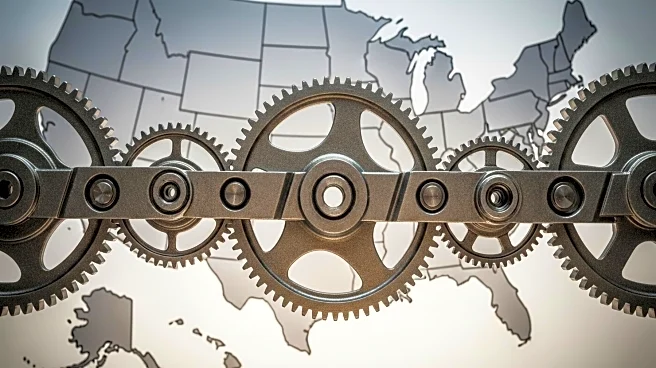What's Happening?
Manufacturers in the United States are increasingly shifting their focus back to domestic suppliers, a trend known as reshoring. This movement is driven by the need to build resilient and responsive supply chains, particularly in high-stakes industries such as semiconductors, advanced manufacturing, and clean energy. The reshoring trend has evolved over decades, initially gaining momentum in the 1980s and early 2000s due to cost reduction and global labor market access. However, challenges such as quality control issues, longer lead times, and rising wages abroad have prompted a reevaluation of offshoring benefits. The COVID-19 pandemic further exposed vulnerabilities in global supply chains, leading to a renewed interest in domestic production. Companies like Finish Thompson are investing in vertical integration and advanced prototyping to meet complex OEM demands, demonstrating the advantages of reshoring.
Why It's Important?
Reshoring offers several benefits, including reduced risk of supply chain disruptions and improved reliability. By sourcing domestically, manufacturers can avoid long-distance shipping delays and minimize exposure to global political and economic instability. This approach is particularly beneficial for regulated or time-sensitive industries where supply interruptions can lead to revenue loss or safety concerns. Additionally, reshoring facilitates closer collaboration with suppliers, enabling real-time design iteration and agile responses to engineering changes. It also provides strategic advantages through access to government incentives and aligns with growing consumer and B2B preferences for U.S.-made goods. Reshoring supports higher environmental and labor standards, resonating with stakeholders prioritizing ESG accountability.
What's Next?
The success of reshoring depends on responsiveness and resilience. Manufacturers must invest in rapid prototyping and advanced manufacturing technologies to efficiently scale production. Companies like Finish Thompson are setting themselves apart by offering customization, speed, precision, and the ability to pivot quickly. As more OEMs consider reshoring, the demand for partners who can deliver reliable products without overseas guesswork is expected to grow. This trend is likely to continue as manufacturers seek to strengthen supply chains, improve sustainability, and support local economies.
Beyond the Headlines
Reshoring is not just about risk mitigation; it represents a forward-looking investment in innovation and long-term growth. It supports local economies and creates skilled career opportunities, challenging the perception of manufacturing as outdated or low-tech. Modern manufacturing intersects software, automation, and advanced materials with hands-on problem-solving, offering compelling career paths for the next generation of workers.











